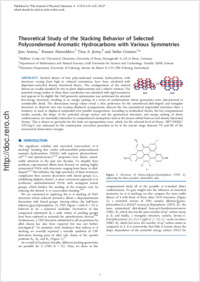Theoretical study of the stacking behavior of selected polycondensed aromatic hydrocarbons with various symmetries
- Antony, Jens Mulliken Center for Theoretical Chemistry, University of Bonn, Germany
- Alameddine, Bassam Department of Mathematics and Natural Sciences, Gulf University for Science and Technology, Kuwait
- Jenny, Titus A. Chemistry Department, University of Fribourg, Switzerland
- Grimme, Stefan Mulliken Center for Theoretical Chemistry, University of Bonn, Germany
-
2012
Published in:
- The Journal of Physical Chemistry A. - 2012, vol. 117, no. 3, p. 616–625
English
Stacked dimers of four polycondensed aromatic hydrocarbons, with structures varying from high to reduced symmetries, have been calculated with dispersion-corrected density functional theory. The configurations of the stacked dimers are readily classified by two in-plane displacements and a relative rotation. The potential energy surface in these three coordinates was calculated with rigid monomers and appears to be slightly flat. Full geometry optimization was performed for selected low-energy structures, resulting in an energy ranking of a series of conformations whose geometries were characterized in considerable detail. The dissociation energy values reveal a clear preference for the symmetrical disk-shaped and triangular structures to dimerize into two in-plane-displaced arrangements, whereas the less symmetrical trapezoidal structures show a tendency to stack in displaced antiparallel over parallel arrangements. According to methodical checks, the key computational results, namely, the shape of the potential energy surface and the geometrical structures and energy ranking of dimer conformations, are essentially insensitive to computational assumptions such as the atomic orbital basis set and density functional chosen. This is shown in particular for the basis set superposition error, which, for the selected level of theory [B97-D3(BJ)/TZV(d,p)] was estimated by the counterpoise correction procedure to be in the narrow range between 7% and 8% of the uncorrected dissociation energies.
- Faculty
- Faculté des sciences et de médecine
- Department
- Département de Chimie
- Language
-
- English
- Classification
- Chemistry
- License
-
License undefined
- Identifiers
-
- RERO DOC 31327
- DOI 10.1021/jp3075207
- Persistent URL
- https://folia.unifr.ch/unifr/documents/302776
Statistics
Document views: 121
File downloads:
- pdf: 267
